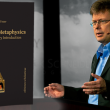Does Everything Happen for a Reason?
by Mark Shea
Filed under God's Nature

A reader once wrote to me to ask: "I have a quick question, and I apologize if it’s awfully trite, but I haven’t been able to find a satisfactory answer after (admittedly, not-so-exhaustive) searching. Here it is: From the standpoint of the Catholic Church: does everything happen for a reason? If it does, it smacks a bit of predestination; if it doesn’t, does that mean that God is out of control or doesn’t care? Say a flower grows on a mountaintop and it dies, and... Read More
Scholasticism vs. Scientism: An Interview with Dr. Edward Feser
by Brandon Vogt
Filed under Christianity and Science, Interviews, The Existence of God

Dr. Edward Feser is one of today's foremost Catholic philosophers who specializes in Aristotelian/Thomistic metaphysics and the philosophy of religion. He's an associate professor of philosophy at Pasadena City College and the author of several published articles and books, including The Last Superstition, Aquinas, and Philosophy of Mind (A Beginner's Guide). He's also written several articles here at Strange Notions. Dr. Feser's newest book, which I'm discussing with him today, is... Read More
How to Perfectly Know the Existence of God
by Joe Heschmeyer
Filed under The Existence of God

It's common today to hear both believers and nonbelievers claim that the existence of God is ultimately unknowable, or at least unprovable. According to this view, we're left to take a leap of faith, or else to go with the option we think is more likely. Classical theism rejects this idea completely. It claims to be able to prove the existence of God - to be able to prove, in fact, that He can't not exist. And what's amazing is that these theists seem capable of following through... Read More
Can We Know God’s Existence with Certainty?
by Dr. Edward Feser
Filed under The Existence of God

The Catholic Church makes some bold claims about what can be known about God via unaided reason. The First Vatican Council teaches: "The same Holy mother Church holds and teaches that God, the source and end of all things, can be known with certainty from the consideration of created things, by the natural power of human reason… If anyone says that the one, true God, our creator and lord, cannot be known with certainty from the things that have been made, by the natural light... Read More
What is a Soul?
by Dr. Edward Feser
Filed under Anthropology

What is a soul? Or to be more precise, what is a human soul? Or to be even more precise, what is a human being? For that is really the key question; and I sometimes think that the biggest obstacle to understanding what the soul is is the word “soul.” People too readily read into it various erroneous notions (erroneous from an Aristotelian-Thomistic point of view, anyway)—ghosts, ectoplasm, or Cartesian immaterial substances. Even the Aristotelian characterization of the... Read More
Revisiting the Argument from Motion
by Bishop Robert Barron
Filed under The Existence of God

One of the unintended but happy consequences of the emergence of the new atheism is a renewed interest in the classical arguments for God’s existence. Eager to defend the faith that is so vigorously attacked today, Catholic apologists and evangelists have been recovering these rational demonstrations of the truth of God; and the atheists, just as eager to defend their position, have entered into the fray. In the process, these ancient arguments, long thought by many to be obsolete, have... Read More
Debunking the “One God Further” Objection
by Dr. Edward Feser
Filed under The Existence of God

Philosopher Bill Vallicella recently replied to what might be called the “one god further” objection to theism. Bill sums up the objection as follows: "The idea, I take it, is that all gods are on a par, and so, given that everyone is an atheist with respect to some gods, one may as well make a clean sweep and be an atheist with respect to all gods. You don't believe in Zeus or in a celestial teapot. Then why do you believe in the God of Isaac, Abraham, and Jacob?" Or as the Common... Read More
Finding God’s Dice

When most people think of Albert Einstein’s contribution to physics, the theory of relativity is what comes to mind, and rightly so. What most don’t realize is that his Nobel Prize was actually awarded for explaining the photoelectric effect, a result which contradicted the classical understanding of light and helped lead to the development of Quantum Mechanics. Despite his major contributions to its development, Einstein was famously uncomfortable with the way randomness and uncertainty... Read More
Seven Proofs for the Natural Immortality of the Human Soul
by Tim Staples
Filed under Anthropology

The late Dr. Antony Flew—perhaps the greatest atheist thinker of the last hundred years—came to faith in God largely through his studies in philosophy and, most especially, science, as he recounted in his book written with Roy Abraham Varghese, There is a God: How the World's Most Notorious Atheist Changed His Mind. It was in 2004 that Dr. Flew rocked the world with his confession that he had come to believe in God. He made clear that he accepted deism, and not the God... Read More
From Faith Came Science: The Condemnations of 1277
by Dr. Stacy Trasancos
Filed under Christianity and Science

In 1277, Étienne Tempier, the Bishop of Paris, issued a list of 219 condemned propositions relating to details of Aristotelian texts that were irreconcilable with the Christian worldview. These propositions were not binding on Christians, but served as a guide for the scholars at the University of Paris. The decree largely dealt with the eternity of the world and creation. The Condemned Propositions The propositions are often referenced by historians of science, and their intent... Read More






